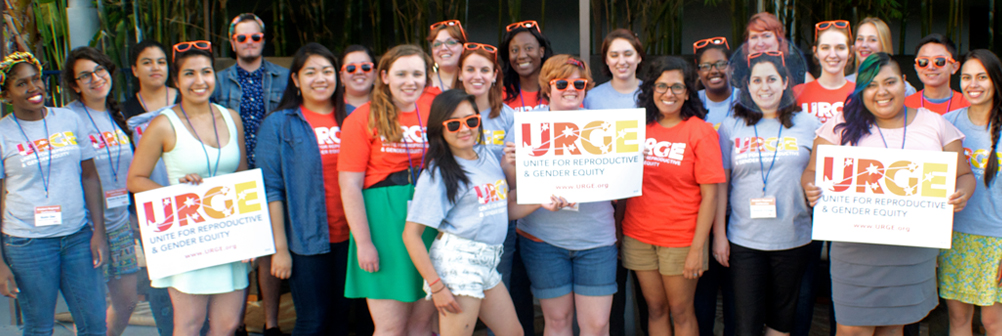Alumni Spotlight: Erica Smiley
School: University of North Carolina at Chapel Hill
Grad Year: 2001
Major: Political Science, Minor in Mathematics
How were you involved with URGE?
I was originally a member of Choice USA (now URGE) as a student at UNC Chapel Hill. I later interned and joined the staff, first as campaign coordinator and then as field director.
What do you do now and how have you brought a reproductive justice frame to the work you do?
I am currently the Campaigns Director at Jobs with Justice. Jobs with Justice believes that all workers should have collective bargaining rights, employment security, and a decent standard of living within an economy that works for everyone. We achieve this by bringing together labor, community, student, and faith voices at the national and local levels to win improvements in people’s lives and shape public discourse on workers’ rights and the economy. We lead and support campaigns that combine innovative communications strategies, solid research and policy advocacy, and grassroots base-building and mobilization.
Limited access to adequate reproductive care and contraception, like many other services and benefits, is something that disproportionately impacts low-income women. In my current work, we fight for workers, especially women workers, to have the ability to organize and bargain with their employers. Through these efforts, women can bargain for the full range of reproductive health options required to support them and their families—from adequate reproductive healthcare to childcare and paid family leave.
What skills or knowledge did you learn from URGE that you use in your current work/life?
One thing that I learned from my experience at URGE, that is critical in my work today, is coalition-building. At URGE, I was a part of building a campaign to improve comprehensive sex education in DC Public Schools, a fight that really required us to build bridges with partners that were not always allies in the reproductive justice landscape overall, but who had similar interests in keeping kids safe and knowledgeable about their options. This has come in handy at Jobs with Justice, where we are a national network of permanent community-labor coalitions, constantly looking to strengthen bridges across demographic, worksite and community to build worker power.
What are your top priorities in politics and/or reproductive justice?
Jobs With Justice is stepping into our role as a hub for strategy development and implementation that works with labor unions, our own local coalitions and other community partners to create campaigns and strategies that help to expand opportunities and vehicles for collective bargaining. We are sharpening our approach and the theory of change that guides our work and learning many things along the way. For Jobs With Justice, our role in shaping the future of work in this country is to advance and expand the future of bargaining.
Our analysis of opportunities for worker organizing and our theory of change emphasize that the problem we are addressing is inequality. Workers must have higher wages, better working conditions and better living standards. The solution is bargaining – both collective bargaining through workplace campaigns and collective bargaining through legislative, policy, rulemaking and industry-wide interventions that put more money in workers’ pockets and improve standards and conditions for workers. Only through bargaining do workers have the power to directly confront the corporate actors behind inequality. We are learning that expanding the theater for bargaining can actually lead to expanded rights and protections for workers (e.g., domestic workers and child-care workers), can change practices of employers (paid sick days, Walmart), and also provides on-ramps for workers to understand collective action, to learn about unions and to form unions or other forms of worker associations…such as JWJ San Francisco’s victory to win a Retail Workers Bill of Rights for fair scheduling and just hours, which built a worker committee to craft the implementation.
Who inspires you?
I’m inspired by so many people, not the least of which are the workers I interact with on a regular basis, many of whom are taking action for the first time. One that comes to mind in particular is a woman named Nancy, from Florida. Nancy is in her 70s, was a Walmart worker, and was sitting down with me in front of Alice Walton’s NYC penthouse to draw attention to the pay gap between one of the wealthiest individuals in the world and the people who built that wealth. She had never been arrested, and her family wasn’t exactly excited about the idea. However, she knew she had to do it for her children and their children. She felt responsibility for future generations of workers to not get taken advantage of by large, low-wage employers like Walmart. As I saw Nancy steadily sit down with her cane in the middle of Park Avenue, any and all complaints I’d had that day left. All I remembered was our shared mission…to change Walmart and build an economy that works for all of us.

